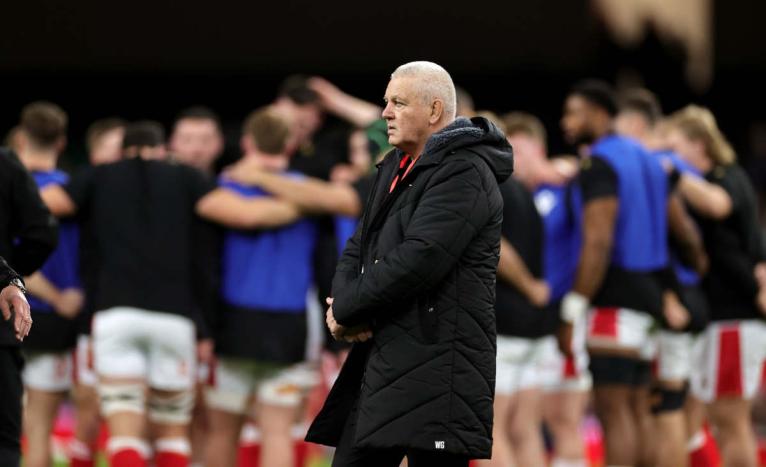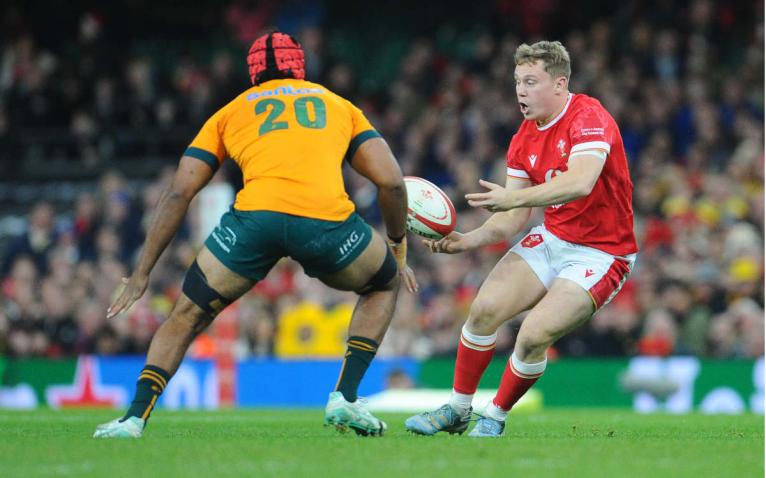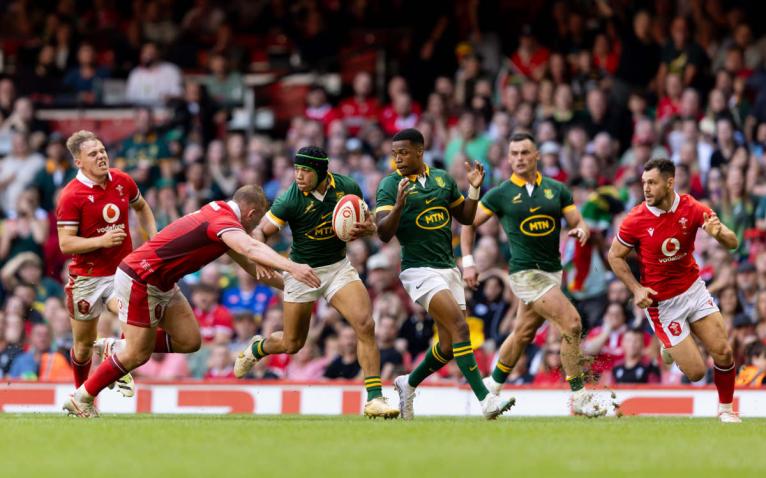November is often said to be the cruellest month for football managers, a time when early-season optimism crashes onto the rocks of harsh reality and club directors start to fret and look for a scapegoat. Of late, the same point in the calendar hasn’t exactly been a barrel of laughs for Wales rugby coaches, either.
Warren Gatland would no doubt agree.
He was in pundit mode during his predecessor Wayne Pivac’s autumn horror show in 2022, with Pivac doing an interview alongside his fellow Kiwi after a game while looking as if he’d prefer to be stretched out on a bed of nails.
For much of that campaign, Pivac appeared haunted – hunted, even. When the Welsh Rugby Union’s then chief executive Steve Phillips toured the Principality Stadium media room before the final game of campaign, against Australia, an Enigma codebreaker wasn’t needed to work out from Phillips’s sotto voce hints to journalists that Pivac was not going to hit gold-watch territory with the WRU. Sure enough, the New Zealander was removed from his post nine days later.
Two years on, it’s Gatland himself who seems to be struggling to find the book with all the answers in.

His TV interview and press conference after the defeat by Australia showed him in a hitherto unseen light. Yes, the occasional spike of defiance was still there – we are talking, after all, about a man who perfected the art of the hard stare long before Paddington had even thought about it – but for most part, the 61-year-old was on the defensive, struggling to control the narrative, with little evidence of the armour-plated self-assurance that once marked his media addresses. It wasn’t so much Gats unleashed as Gats under the cosh. Who’d have thought such a day would come?
But it’s the Wales coaching job.
Turn back the clock to the Kevin Bowring era with the journalist Mark Reason writing: “The job of Welsh coach is like a minor part in a Quentin Tarantino film: you stagger on, you hallucinate, nobody seems to understand a word you say, you throw up, you get shot. Poor old Kevin Bowring has come through the coaching structure, so he knows what it takes … 15 more players than Wales have at present.”
Some people still believe in Gatland, despite the New Zealander presiding over the worst run in Wales 143-year history as a Test-playing nation.
How much has truly changed close on three decades later?
Yet some people still believe in Gatland, despite the New Zealander presiding over the worst run in Wales 143-year history as a Test-playing nation. By 2pm on Wednesday, a poll on the WalesOnline website had seen 57 percent of respondents answer ‘yes’ to the question ‘Is Warren Gatland still the right head coach for Wales?’ Of course, it is possible that Gatland himself had been busy pressing the ‘yes’ option multiple times after the Australia defeat last weekend, but more likely is that there are plenty of folk out there who don’t see too many better options for the job.
🗣️ “It is the most challenging phase in my coaching career, whatever decision is made, it’ll be the best one for everyone involved”
🏴 Warren Gatland speaks on @WelshRugbyUnion‘s historic losing streak and his future in the role#AutumnNationsSeries | #WALvAUS pic.twitter.com/v1Z5vTrGXf
— Rugby on TNT Sports (@rugbyontnt) November 17, 2024
Problems in the Welsh game are deep-rooted and close on everywhere you look.
Take development. Once, Wales were competitive at U21 or U20 level, winning Six Nations Grand Slams in 2005 and 2016 and finishing runners-up in 2008 and 2013. But over the past eight years, the fledgling Dragons have finished in the top three just once, in 2017, hitting a low in 2023 when they failed to win a single game. Nostradamus isn’t needed to flag up potential trouble ahead if the future is not properly planned for.
While the WRU’s emphasis on Team Wales brought success at senior level, below there has been ordinariness for too long. Significant responsibility for that must rest with those charged with overseeing the game in Wales. However much investment has gone into growing the next generation, it evidently hasn’t been enough. So we are left with a dearth of young players properly equipped for the modern-day game. Eventually, that is going to translate into a major problem at the highest level, whatever the name on the national coach’s door.
Lack of success at regional level has understandably tested the spirit of even die-hard supporters. And even now, with a rejigged WRU board, there are still significant knots to undo in relations with the pro teams.
Then there are Wales’s professional teams, who have been operating on a far-from-level playing field with modest budgets that give them little chance of making a decent fight of it against rivals boasting deep pockets and deep reserves of playing talent.
Lack of success at regional level has understandably tested the spirit of even die-hard supporters. And even now, with a rejigged WRU board, there are still significant knots to undo in relations with the pro teams. We can’t be sure that Love Is In The Air by John Paul Young is played in the background every time representatives from the union and the pro teams meet.
A book might be needed to adequately cover other areas of concern in the Welsh game which directly or indirectly impact on the national team and their coach.
But Gatland can expect the arrows to keep flying his way, particular with South Africa in town this weekend.

His selection to face the Springboks can charitably be described as bold, with experience a scarce commodity in a backline that boasts just 61 caps – 25 fewer than Damian de Allende has amassed on his own.
And at half-back, Wales need Sam Costelow and Ellis Bevan to provide a lead. Gatland could have chosen Gareth Anscombe and Rhodri Williams, who impressed off the bench against the Wallabies, but he has opted for two youngsters with just four starts between them in the URC this season.
Wales also need to get their lineout right. They missed Adam Beard after he left the field last weekend, with the whole operation coming close to falling apart after Dewi Lake left the pitch in the second half. Ryan Elias saw a handful of throws miss their targets, with the hosts ending up with a 67 percent return over 80 minutes – a figure that would not have prompted the coach of the Lamb and Flag thirds to turn cartwheels had his pack come up with it.
Gatland has recalled the 6ft 5in Taine Plumtree to strengthen the Welsh lineout, while Wales will hope their scrum repeats the strong effort against Australia
Gatland has recalled the 6ft 5in Taine Plumtree to strengthen the Welsh lineout, while Wales will hope their scrum repeats the strong effort against Australia. That said, the late change to South Africa’s front row would doubtless have elicited a mixed response from the home props. “Good news, lads,” you can imagine forwards coach Jonathan Humphreys telling all concerned. “Ox Nche is out for Saturday.” Cue cheers all round. Then Humph imparts the not-so-encouraging tidings. “Wilco Louw is named as a starter.”
It’s akin to a 1980s boxer learning Thomas Hearns has withdrawn as his scheduled opponent, to be replaced by Marvin Hagler.
No one knows if Humphreys ordered triple practice in the pushing and shoving business after the news came through, but Louw is as close to being a scrum on his own as it’s possible to be.
🙌 When they’re good, they’re great!
🇦🇺 The @Wallabies run riot in Cardiff!#AutumnNationsSeries | #WALvAUS pic.twitter.com/OJTETnwRpJ
— Rugby on TNT Sports (@rugbyontnt) November 17, 2024
Wales could also do with improving their breakdown efforts and their back play. Over two games, just three players have made linebreaks, while the passing hasn’t always been precise and Wales have often failed to keep attacks alive.
Positives against Australia? The aforementioned scrum. Jac Morgan returned an impressive set of stats, with 27 tackles, 14 carries and a turnover. Tom Rogers was outstanding.
But of course there needs to be more. Much more.
Anyway, whatever happens on the pitch against South Africa, the home coach will continue to be the story.
Who would want the job if he does go? There are always potential candidates out there who would put their hands up, but how much difference any of them might make would be debatable.
Emperors come and go, as do prime ministers, football managers, tennis players and even Radio 2 disc jockeys. Gatland knows as well as anyone else that revolving doors and rugby coaches are not exclusive of each other, but at the team announcement on Wednesday he responded to a query about whether he had a strong desire to continue by declaring: “Absolutely.”
He further insisted there was no break clause in his contract, meaning it’s likely to be over to the WRU as to whether he stays in post for the Six Nations and beyond.
Who would want the job if he does go? There are always potential candidates out there who would put their hands up, but how much difference any of them might make would be debatable. A new coach, after all, would face the same problems the old coach faced and have the same players to work with. Minor tweaks in selection and rules might see, say, a Jarrod Evans, a Joe Hawkins or a Sam Davies come into the picture, but a complete overhaul would be unlikely. The depth of talent isn’t out there.
That hasn’t stopped bookmakers from drawing up a list of runners and riders for the job should Gatland depart, with Steve Tandy seen as favourite, followed by Ronan O’Gara and Brad Mooar, with Jonathan Humphreys, Franco Smith, Michael Cheika, Shaun Edwards and Stephen Jones also mentioned.

Let’s see what happens.
History buffs will tell you that the former prime minister Harold Wilson once stood up at a Labour Party conference to address speculation about his future.
“May I say, for the benefit of those who have been carried away by the gossip of the last few days, that I know what’s going on,” he said.
“I’m going on.”
And he did go on, for another seven years.
Right now, some will be surprised if Gatland lasts another seven days.
But do the union have the money to pay him off? Is there a better coach out there? And do the governing body have a potential replacement in mind?
Questions, questions.
But Welsh rugby isn’t famed for coming up with the right answers.


Removing Gatland before the 6 nations is not going to change much imo. I think the Welsh rugby board have a lot to answer for. There needs to be a major reshuffle there and public ownership of a woeful deterioration to a once proud rugby nation.
NZ are rebuilding around some very experienced and accomplished players. Wales not. Their starting 15 has fewer caps than about 3 of the more experienced Boks.
Whoever the Welsh head coach is, they are going to need at least another 12 months to start showing real success.
It would be crazy to move on from Gatland, IMV.
I don't think it'd do them any harm to move on from Gatland. It can't get any worse in terms of results. Makes sense to bring in some fresh blood... That said I've never rated Gatland as a coach. Shaun Edwards is the coach they needed back.